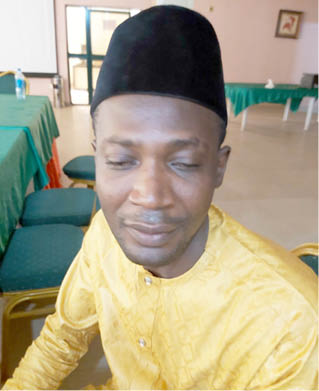I want to be a professor – Visually impaired school administrator
Thirty-three-year-old Hudu Isah Kebbe is visually impaired but not deterred from reaching the zenith of academic pursuit. “I am targeting to be a professor, Insha Allah,” he said. The physically challenged man, who hails from Kebbe Local Government Area of Sokoto State, is the first visually impaired indigene of the state to graduate from the […]

Hudu Isah Kebbe
Thirty-three-year-old Hudu Isah Kebbe is visually impaired but not deterred from reaching the zenith of academic pursuit.
“I am targeting to be a professor, Insha Allah,” he said. The physically challenged man, who hails from Kebbe Local Government Area of Sokoto State, is the first visually impaired indigene of the state to graduate from the Usmanu Danfodiyo University.
The vice principal (Administration) of Adisa Raji Special School, Sokoto, has always been a shining star. He was one of the best students in secondary school, had an excellent result at the College of Education, as well as a Second Class (Upper Division) in English Language from the university.
Born in Kebbe town on February 12, 1987, Isah attended Yakubu Muazu Model Primary School, Sokoto from 1994 to 2000 and Sultan Bello Secondary School, Sokoto (2000-2002). He did this while he still had his sight. He was not born blind. But an accident occurred that took his vision at age 11.
“I was playing with one of my brothers when a tree fell and hit my eyes. I underwent many treatments here and abroad; unfortunately, it was destined to be like this, and I accepted it,” he said.
In 2002, he gained admission into A.A Raji Special School, Sokoto following the visual problem.
He said the visual impairment presented a lot of challenges, but with parental support, he waded through.
“I must appreciate my family because they gave me maximum support to be who I am today,” he said.
Kebbe completed secondary education in 2006 in flying colours. He scored six ‘As’ and three ‘Bs’ in the West Africa School Certificate examination and an equally excellent result in the National Examinations Council (NECO) to emerge the best student from a public school.
“I gained admission into the Shehu Shagari College of Education in 2006, where I read English/Social Studies and graduated in 2009. I waited for my result for a year and got admission to read English Language at Usman Dan Fodiyo University Sokoto. I started from 200-Level because of my good results.
“I graduated in 2013, and by 2014, the Teachers Service Board, Sokotoemployed me and posted me to Adisa Raji Special School as a teacher,” he said.
Five years later, he was promoted to the position of a vice principal in July 2019.
Kebbe, whose hobbies include reading, travelling and writing, has presented a lot of papers at various fora.
He is in the process of applying for a master’s degree programme.
Kebbe got married three years ago to a woman without physical challenge.
“Before I met my wife, I had opposition from the families of the other women I wanted to marry. On one occasion, I even travelled to Niger State for the marriage issue, but in the end, the family rejected me. I went to Minna, Niger State, not knowing anybody, just because of that girl. But now, Alhamdulillah, I am getting the reward. I have no problem with my wife; she is very loving and caring.”
The visually impaired, who is the first male child of his parents, also said, “If every physically challenged person has a father like mine, he or she could reach any height. He stood against all the odds, and now he is proud of me.”
He stressed the need to ensure that the rights of the physically challenged are adequately protected. He lamented that generally, physically challenged persons are not shown love, which he said robbed them of self-confidence.
“We are not given the right to participate, except when we fight for this right.
The society should show us love and support, we want to be recognised. And we want to contribute to the development of the nation,” he said.
He expressed joy that with his achievements, many parents have shown interest in training their physically challenged children.
